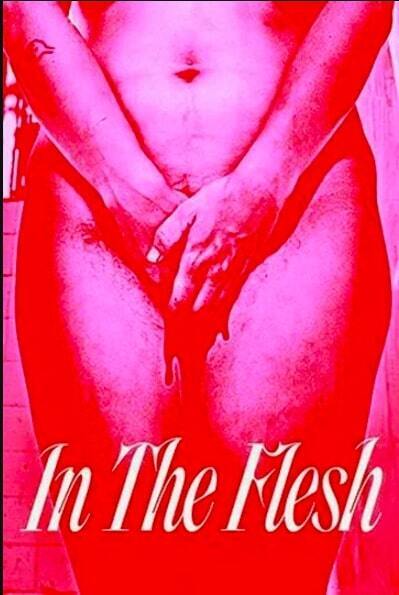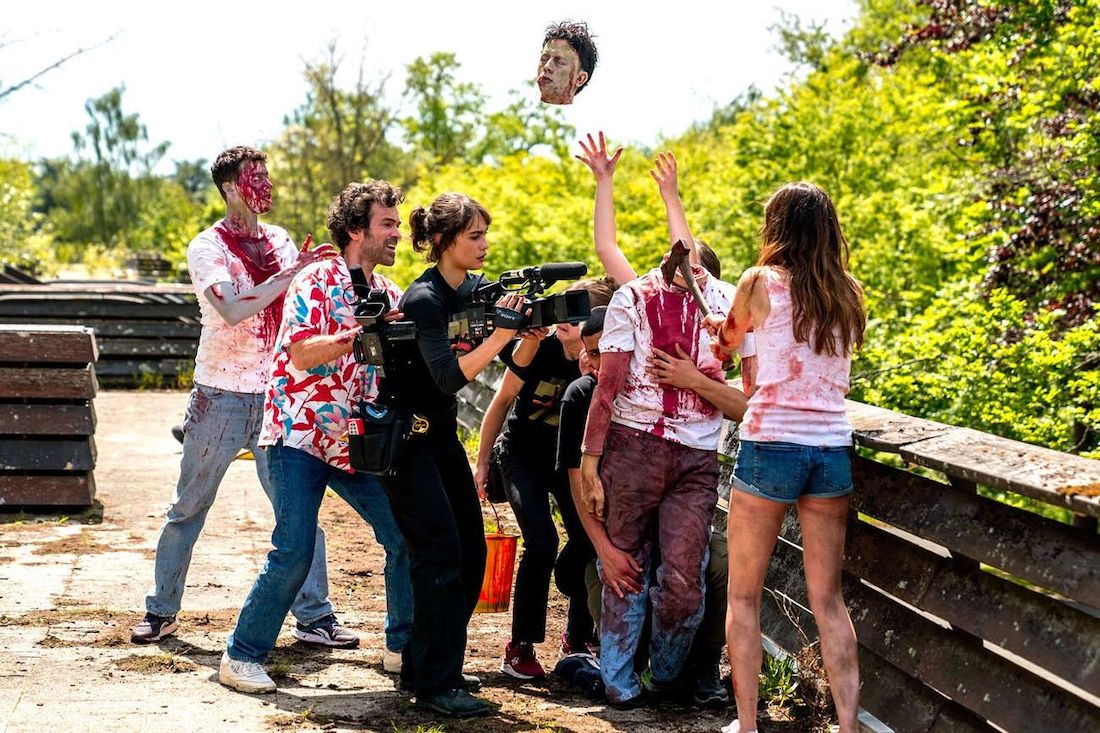The first full day of Fantasia 2022, the Montreal festival’s first fully in-person event since 2021 (so much that this 26th year is sometimes called the 25th) was about family. That was not an intentional theme, but how could it not be at a horror/sci-fi-/fantasy/comedy/whatever-you-want movie festival: film is a shared experience, made by a bunch of people, and as Fantasia emphasizes, it sure is best seen with a bunch of other people also looking to have fun.
I had the joy of kicking off my Fantasia feature experiences with Michel Hazanavicius’ “Coupez!”, formerly known as “Final Cut” and “Z!”. This is one of those movies that makes you like a filmmaker more as a person; what a joy it is to see the same guy who made “The Artist” take his love for silent, classic movies—classy movies, considered by some—and give an equally warm bear hug to bad movies, to disastrous film sets, to cheesy effects. Hazanavicius reminds all viewers of why we love movies: they are alive with their equal flaws and promise. “Coupez!” is Hazanavicius’ remake of Shin’ichirō Ueda’s “One Cut of the Dead.”
The movie premiered last May at the Cannes Film Festival (our own Ben Kenigsberg did not like it, noting its many similarities), and is making its North American premiere at Fantasia. Romain Duris and Berenice Bejo star as a director and star in an originally wildly saturated and bad movie about a director wanting to make a zombie picture as authentically as possible. This makes up only the first 30 minutes of “Coupez!” (not a spoiler, but a comforting head’s up), and let’s just say that Hazanavicius’ overall film does include plenty of cuts, along with a time jump to one month before, when the movie we just saw now being produced and planned.
For that first 30 minutes, “Coupez!” gets close to being a one-note joke about the cheesiness of horror productions, what with their bad acting, overwrought cinematography, and general cheap nature. But as it opens up even more to the process of making a movie, Hazanavicius rewards patience by building its knowing sense of silliness, and it doesn’t entertain cynicism but uses the coarse language of B-movies to make one re-appreciate the magic of cinema. Hazanavicius is egoless about this, and he executes character-based puke, diarrhea, and broken film equipment jokes with the same accomplished choreography of “The Artist.”
One of the savviest choices in this tale concerns how a live broadcast angle is included in the inside production—the one-take concept has a different purpose in this story than just a show-off. And in an era in which long takes are progressively common among larger budget projects, like Sam Mendes’ “1917,” “Coupez!” uses the way an audience follows and soaks in the contents of a single take to then make you appreciate all that goes into making it happen. Sidney Lumet says in Making Movies about how there are no small decisions in moviemaking, and the incredible third act of this movies has one appreciate that truth in ways that are poignant, heartwarming, and clever all at once. The stakes are not about zombies but the equally crushing circus act of filmmaking, and what was at first amusing about the original movie-within-the-movie becomes laugh-out-loud funny with an all-human ambition.
“Coupez!” is a gift for those who love bad movies, not to scoff at them, but because you always root for them to soon get something right. It was a perfect feature for me to start Fantasia with, a festival that chants “Bon cinema!” each time before the lights go down. When you see a movie like “Coupez!” or “One Cut of the Dead” with fellow lovers, their meaning can transcend their constructs right before your eyes.

On Friday night, Fantasia celebrated John Woo, a titan filmmaker that artistic director Mitch Davis deemed “a spiritual father of Fantasia,” given Woo’s influence on the action genre and all movies that find meaning and craft in the extreme. Woo received the festival’s 2022 Career Achievement Award and introduced his legendary “Hard Boiled” by thanking many people, including his influences: his mother, for taking him to see Chinese films and Hollywood fare, including musicals (his father wrote off movies as “fake”); the directors of the French New Wave, including Truffaut, Melville, and Demy; and the stunt people of his films, who he admires. Woo had recently received his recent injury off-set—chasing his two-year-old granddaughter—but channeling the same spirit of his movies, he kept going, and he was ready to share his love for cinema. Woo apologized for having a cane and wheelchair, to which the audience, in unison, showered him with words of love and support.
Woo then proceeded to sit down to enjoy the first and third act of his film, which lest we forget features Chow Yun Fat playing a jazz clarinet solo in the opening credits. Needless to say, “Hard Boiled” remains one of the greatest action movies of all time, a genre feat that doesn’t just raise the bar for action spectacle but dared anyone to even look at it (and some of Woo’s best predecessors have). Shown last night on a loved 35mm print, the film has its own magnitude, its grand-Guignol-of-grand-Guignol hospital sequence roaring all the more like a non-stop apocalyptic thunderstorm. The 35mm presentation also made me further appreciate Woo’s slow motion and character-based style—the components that make movies “fake,” but gorgeous and poetic in how they elevate tone and storytelling. It’s about Tony Leung strutting through a library looking for a book with a pistol stored inside, or watching the balletic stunt dives through glass that are so common they become impressionistic.
After the film, Woo spoke in a Q&A about the drive behind “Hard Boiled”—he was angry about the crime in Hong Kong at the time, and wanted to answer it with what he called “Hong Kong Dirty Harry.” Woo painted a picture of an intense shoot that was held together by family, and because of conditions that would rightly be considered dangerous, did lead to real blood and sweat throughout. Tony Leung almost lost his eyesight after a sequence with glass (they couldn’t afford fake glass, said Woo) blinded him for a week. It was also funny to hear Woo talk about getting tired of all the explosions and gunfire in his own movie as if even the master of these sequences has a breaking point.
Woo even joked about how his stunt figures would be excited to die on a certain filming day so that they could then go home. The screening of “Hard Boiled” felt like a tribute to all of that incredible work, for a movie that does not believe in limits and keeps pushing, but was only made possible by the incredible team. The only way the screening could have been better was if the stunt team or filmmaking crew was all there, but it became clear that Woo held them in his heart as the festival only began to celebrate what makes Woo’s cinema a foundation.

It was certainly a Fantasia family event earlier in my first full day when I screened the 4 pm shorts program “Cavalcade of Perversions: A Regular Little Orgy,” my way of going al carte with the Fantasia experience given how Air Canada’s definitive awfulness made me miss the opening night movies. A few highlights:
“Mara,” directed by Catharina Schürenberg, takes a character study about a cam girl and what she can and cannot show on her cam feed to a striking end. It lives and breathes on the performance of Erin Carroll, who shows a gradual lack of passion for an industry that comes with gross bylaws; the story has a non-fiction angle as an experiment involving a real livelihood, which makes an impactful point by the end.
Writer/director Daphne Gardner’s “In the Flesh” is the kind of short that you only think is about a woman trying to masturbate in her tub before raw sewage explodes through her pipes—it’s a movie that creates a nightmare all its own, thanks to confident hard turns between gross-out comedy and unsettling dread. Gardner makes all of these wild flourishes feel at home, and of the shorts that screened this is the one that made me most want the feature version, or whatever script has been kicking around in Gardner’s head.
“Beauty and the Beast,” by Mathieu Morel, is my winner of the film that took me on a roller coaster ride of confusion and intrigue, detonated said metaphorical tracks, and then rebuilt them with the poetry of unblinking perversion. Maybe it was the chaos that was stoked when its reading of “Beauty and the Beast” ended with shiny PSA ‘90s graphics that glow “I F**cked Your Mom … and Your Dad.” It’s the kind of antagonistic but also realized short that goes for impulse and pleasure, especially with its pornographic scenes of two men having oral sex, one of them in a puppy mask.
The block had other gems too: Caroline Lindy’s “Aspirational Slut” showcased a funny and endearing performance by Ellyn Jameson of a woman slowly learning to separate good, fun sex from commitment; Jim Daviola’s “Pretty Pickle” whips out a great surprise toward the end of its black-and-white Chicago love story; Alexandra Neuman’s “Semen Retention for a Better Tomorrow” uses coarse claymation for evocative images of naked bodies, the earth, and even some harp playing.












